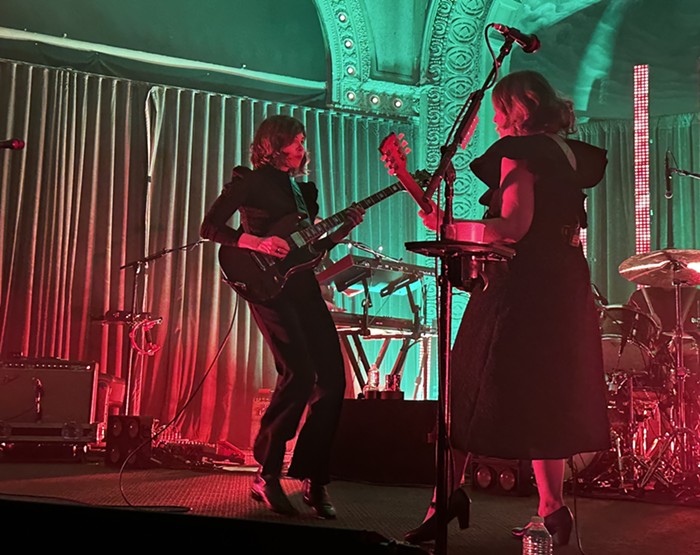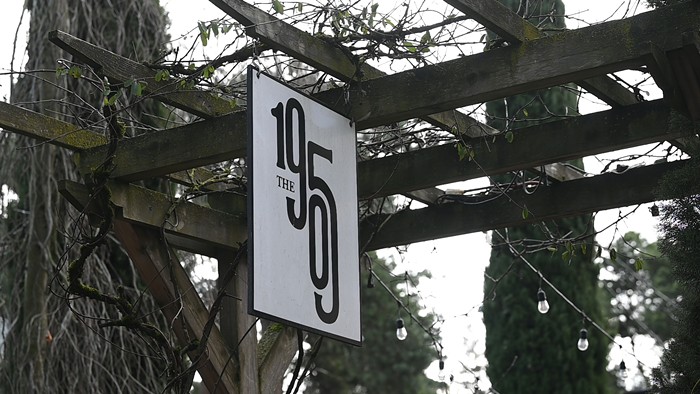HARRISON SMITH sits with his thin arms and legs folded neatly under the table, one eye squinting in the shifting sunlight. We’ve finally met up after a series of missed connections—the latest being that 20-year-old Smith had to return home to Washington for wisdom teeth surgery—to talk about his band Turtlenecked’s debut full-length, Pure Plush Bone Cage.
Smith is Turtlenecked and Turtlenecked is Smith. Both are spare but intentional, rambunctious but removed, a bit bratty but magnetic. Smith has a uniform aesthetic; his press photo depicts him in cream-colored linens, leaning against a bare cream wall, offset only by a Smiths record purloined from his college radio station and a stack of books, spines turned out to reveal titles like Infinite Jest and Naked Lunch. This image encapsulates the heart of Turtlenecked: The stack of references and symbols threatens to overtake the creator. Turtlenecked derives nervous energy from this high-wire balancing act.
Smith enjoys order. He laughs as he describes a former roommate as living in a “trash heap,” and mentions that “every once in a while I’ll just clean it all up... it’s very satisfying for me to start new songs with a clean new Logic file.” Each song on Pure Plush plays like a clean slate: “I Always Suspected I Was Watching Television” sounds like Gang of Four colliding with an anthemic resolution from the Strokes; “Weakling” recontextualizes the careening harmonies of Dirty Projectors against a svelte Wire-esque thrum.
Hearing Smith talk about Pure Plush, you get the sense he defines the record more by what he left out than by what he put in. Eleven of its 12 tracks clock in at less than two and a half minutes. “I definitely side more with limitations and limiting myself to a smaller palette that I know can communicate something,” he explains. “I showed my dad Joanna Newsom and longer songs that were like 12 minutes and he was like, ‘Oh, this is shit, all you need is two to three minutes.’”
Upon opening the hood of his own works, Smith realized that “music is less magical than I thought... There were all of these limitations and things you have to be aware of.” Early Turtlenecked fumbled with raw expression and some forays into genre: “My first [release] was, ‘Oh I guess I’ll just make some indie rock and see what it sounds like,’ and the second one was electronic.” Pure Plush represents a steely focus: “I just wanted to make an art punk, an experimental punk record.”
Like the post-punk Smith emulates, Turtlenecked uses raw text to create a misshapen patchwork of aesthetic touch points. The whole thing is very internet. The titular Dutch painter of Turtlenecked’s song “Mondrian” is an appropriate allusion—both artists obsess with gleaning humanity from mere surface—but the saccharine pop song is in reference to a bitter Bukowski poem that mentions the painter. “I like juxtaposition in music,” he says.
Youth defines Turtlenecked, but it’s not a brash, ignorant quality. Smith eagerly dates musical discoveries to “the beginning of sophomore year [of college],” before qualifying with a winking “so, not that long ago.” A nervous grin spreads on his face when he describes recording vocals in his dorm room before quiet hours. If anything, Pure Plush Bone Cage’s most tantalizing aspect is promise: If this is Turtlenecked at its most raw and unformed, what’s next?


















